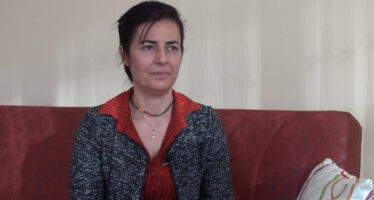Olive Harvest Time In Rojava
![]()
Following the economic collapse in Syria that followed the beginning of the conflict in March 2011, Kurds are reclaiming their lands and creating economic opportunities in harsh conditions by encouraging cooperatives.
The collecting of olives started in October. The harvest will be followed by olive oil production. There is significant and intensive work currently ongoing in olive oil production sites, called “maseres”. Meanwhile, masere owners are complaining of the lack of tools due to the embargo, and the increased price for olive containers and labor.
Re?id Hesen has been producing olive oil in the district of Raco in Efrin for 60 years. He says the tools for production have become very expensive due to the war and embargo: “Before an empty can was 180 liras, now it is 500 liras. Wages have increased from 500 liras to 1000 liras. We are running short of 100-kilo bags, so we have to use 50-kilo bags instead.”
In Efrin, there are scores of “maseres”. The harsh economic conditions imposed by the embargo have meant that only 12 of the 20 “maseres” will be ready for production in Raco alone. However local women are inventing their own solutions for the lack of tools and resources. In the place of the tents they normally place under the olive trees workers are using old pieces of fabric, while workers have also begun to recycle containers from last year in order to store the olives and the olive oil.
In Syria, the population of Kurds is estimated to be 3.5 million, making up more than 15% of the entire Syrian population. Before the war, half a million were living in Damascus, while 600 thousand Kurds were residing in the Ashrafieh and Sheikh Maksoud neighbourhoods of Aleppo, but after the war began some were forced to flee to Rojava, or Kurdish regions in the north and west of the country.
The warm climate of West Kurdistan makes it a rich agricultural region. Along with water, gas and oil resources, West Kurdistan produces olives, grains and vegetables, among others goods. Kurds have not been able to benefit from the affluence of these lands until now. In the past the produce were taken away by the Damascus administration, to be produced in Syrian towns. There are no factories, refineries or universities in the region. The “Arab belt” policy started in 1962 has led to the forced mass migration of Kurds. Since the revolution in Rojava, however, this is beginning to change.
* Translation by The Rojava Report
Related Articles
Yaşar: Hunger strikers risk death to see life prevail
![]()
Sevican Yaşar took part in the hunger strike launched in 2019 for the lifting of the isolation of the Kurdish
Carlo Giuliani senza giustizia. Intervista a Haidi Giuliani (VIDEO)
![]()
E il Mensile, Radio Popolare Network, PeaceReporter. Il Movimento, Carlo, la Valsusa e un grosso problema della democrazia rappresentativa. Piazza



